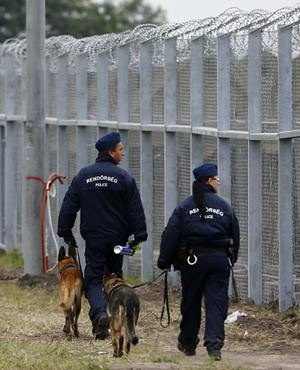Confusion, desperation as migrants rush into Hungary

Rszke – As night fell on Sunday at the refugee transit camp just inside the Hungarian border, confusion reigned over the ever-shifting news and rumours from around Europe.
UN refugee agency staff were only just hearing that Germany had begun passport checks at its borders and were unable to give definite answers to clusters of refugees worried about what to do next.
“I do not want to stay in Hungary. We are afraid to go with police,” said Yusuf, a Syrian in his 20s.
“If they take fingerprints, will they make us come back here?” he asked, reflecting a widely-held fear among migrants.
The UNHCR staff member, who asked not to be named, told them the only thing he knew for sure: that for now, “zero people are being sent back to Hungary. No one wants you to stay here.
“The safest way is to follow the police and get on the buses,” he told them. “What other choice do you have? You can go back to Serbia and spend thousands of euros with the mafia people smugglers. The result is the same.”
But as record numbers stream into the European Union, the truth is no one knows for sure what the rules are anymore.
Technically EU laws says migrants should be deported back to the first place they registered upon entering the 28-nation bloc, but that has been widely ignored amid the current crisis.
Of a group of around 20 Syrians, a show of hands found only three were actually heading for Germany, all members of one family who said they had heard it was “a beautiful country with jobs”.
Throughout the day, refugees who spoke to AFP gave a wide range of destinations. Norway and Finland were often mentioned.
“I would love to go to United Kingdom but I hear it’s very hard,” said Banghi Saddun, a 27-year-old Syrian Kurd from Kobane hoping to complete his civil engineering studies.
“I haven’t decided where to go yet. Maybe The Netherlands,” he said.
‘We were very lucky’
And still they came, hundreds emerging endlessly from the pitch-black fields down the railway tracks from Serbia.
Many have rushed to get here before Hungary seals its border on Tuesday. Police said a record 4 330 migrants entered on Saturday.
Only a small gap of 30-40 metres remains in Hungary’s brand-new barbed-wire border fence, ready to be filled at a moment’s notice.
“We were very lucky,” said Shadi Dalati, a 39-year-old from Raqqa, the headquarters of the Islamic State group in Syria, travelling with his wife and two friends.
“We knew the Hungary border was closing so we have not stopped moving since we left Turkey a week ago. We only slept on buses.”
Refugees who miss the deadline potentially face a mammoth detour around Hungary to Croatia or Romania. And there are many on the way: authorities on the Greece-Macedonia border say 5,000 people crossed overnight on Saturday.
“Hungary has become a place of humiliation and suffering for these asylum seekers,” said Peter Bouckaert, emergencies director for Human Rights Watch, standing at the border.
“They have come from war zones. They’re not just going to turn around because there’s a fence, and we can’t build fences all around Europe.”
Goodwill and mess
Inside the filthy transit camp, a woman, bent-double and on the verge of collapse, was helped into the medical tent.
She carried her young daughter for hours on her shoulders and looks to be in severe pain, but refuses help from the doctor, embarrassed at how filthy she is.
Thanks to an outpouring of help from across Europe, the camp is functioning, with medical help, clothes, food and even special breastfeeding tents.
But all the aid brings its own problems.
“The goodwill is immense and welcome but if it goes uncoordinated, you see the mess,” said Babar Baloch, spokesperson for the UN refugee agency.
He gestures at the giant piles of rotting food, filthy blankets and discarded clothes strewn everywhere — the detritus of a weary people shedding items sodden by last week’s rain, which has been replaced by blistering sunshine.
“Yesterday, a group brought 24 tonnes of aid, not knowing what is needed.”
Keeping families together has been one of the biggest challenges amid the relentless movement of people.
A couple are crying their son’s name: “Ahmed! Ahmed!” They look on the verge of hysteria. They are right at the entrance to the European Union, but they turn back into Serbia in a desperate search for their son.




